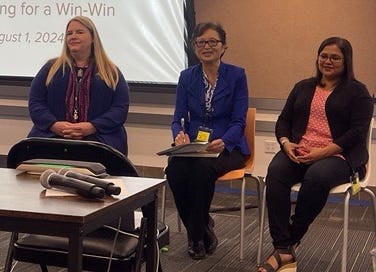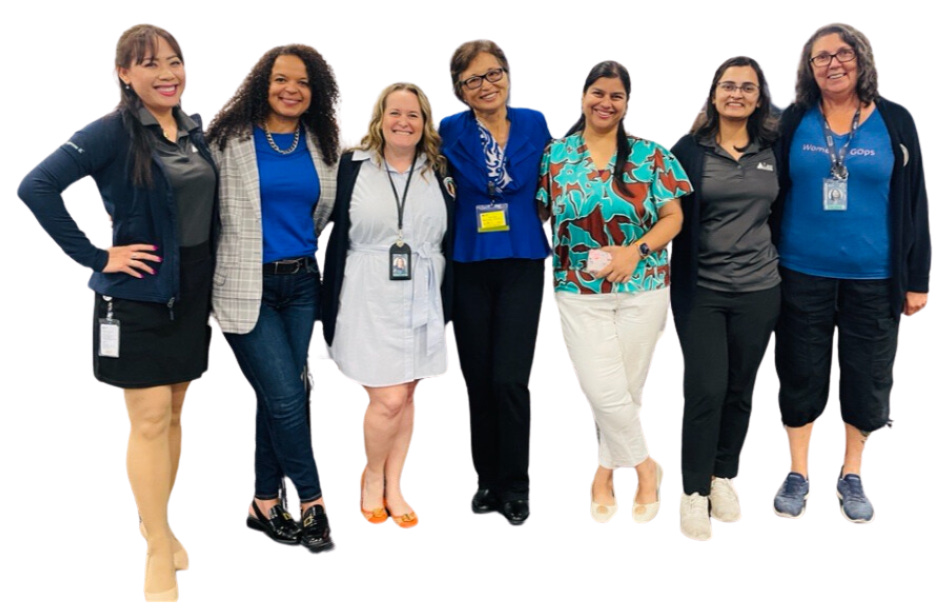FountainBlue's August 1 Front Line Managers Online program was on the topic of 'Negotiating for a Win-Win', conducted both on-site and online at our Lam Research host location. Please join me in thanking our panelists.
as a Program Leader – Nancy Gilbert, Director of Program Management, Lam Research
as a Product Leader - Ronald Goossens, Part-time Consultant at ASML and Adjunct Professor at Purdue
as an Engineering Leader - Kavita Shah, Vice President, Process Technology, SunRise Memory Corp.
with introduction by Wendy Wright, Project and Program Manager, Lam Research
We deeply appreciate your flexibility and support as we navigated our first on-site *and* online session since March 2020, with the emergence of the pandemic.
We were fortunate to have a diverse, passionate and experienced set of panelists representing a wide range of backgrounds and challenges. They were exceptional in the way they navigated complex challenges, communicated and connected with a wide range of stakeholders, and inspired, motivated and instructed us all to seek the negotiation win-win with perseverance, creativity, resourcefulness and grace.
Below are some thoughts about negotiations:
Negotiation is not just for those who are in business and sales, it's for everyone.
Building strong relationships is foundational for successful negotiations. Plan to create a win-win negotiation so that you can further build on those relationships.
There are many things to negotiate beyond money - there are resources, project participation, benefits, shift times, etc.,
Below is a compilation of their suggested best practices.
Be Strategic
When possible, aim for a win-for-all where possible, working with trusted partners with shared interest, acting with integrity, demonstrating good will.
Align with the strategic direction of the organization, the values of the organization, the shared motivations of the stakeholders.
Gain a wide breadth of knowledge and experience so that you are well informed and connected when participating in a negotiation.
Know the anchoring points for the negotiating parties and then find the joint road map based on those anchoring points.
Be creative and resourceful with your negotiation strategy. For example, if you don't have the data, try extrapolating other data or using an inspirational story, or leveraging an executive contact.
Navigate the guardrails between what the science will allow and what the business can resource/support as you negotiate.
Understand and work within the risk appetite for your organization, especially as you work on cutting edge/bleeding edge projects.
If the negotiated result is failing, fail fast and learn from it and proactively communicate the shifts and the learnings.
Leverage Your Network
Create and build a broad and deep network of relationships, an ecosystem of trusted stakeholders and continue to collaborate, delivering win-win results for all parties.
Share your negotiation successes and learnings with your network as they may set you up for the next successful negotiation.
Know when to escalate, leveraging your network, talking to stakeholders who are not currently at the table to break a logjam for example.
Know Your Stakeholders
Know the assumptions and motivations of the stakeholders.
Build in optionality in your proposals, with an eye on the motivations of your various stakeholders.
Listen attentively to what's said and what's not said, but what's meant.
Ask questions out of curiosity and make sure that everyone feels heard.
Plan and Manage the Negotiations Well
Focus on getting the metrics, but avoid analysis paralysis, where you're waiting for too much data to proceed and delay making an agreement or decision.
Know your walking point, your non-negotiables - the point where you decide for specific reasons *not* to continue with a negotiation. With that said, make efforts to maintain the relationships.
The greatest learning for me was that negotiation is more an interactive, multi-dimensional give and take, a respectful exchange of ideas and strategies rather than a simple one-dimensional formula.
The best negotiators, like the ones on our panel, are people who are experienced, have high-integrity, and are strategists and problem-solvers who are invested in the success of all stakeholders involved.
We are grateful that they shared their wisdom with us for this program.






